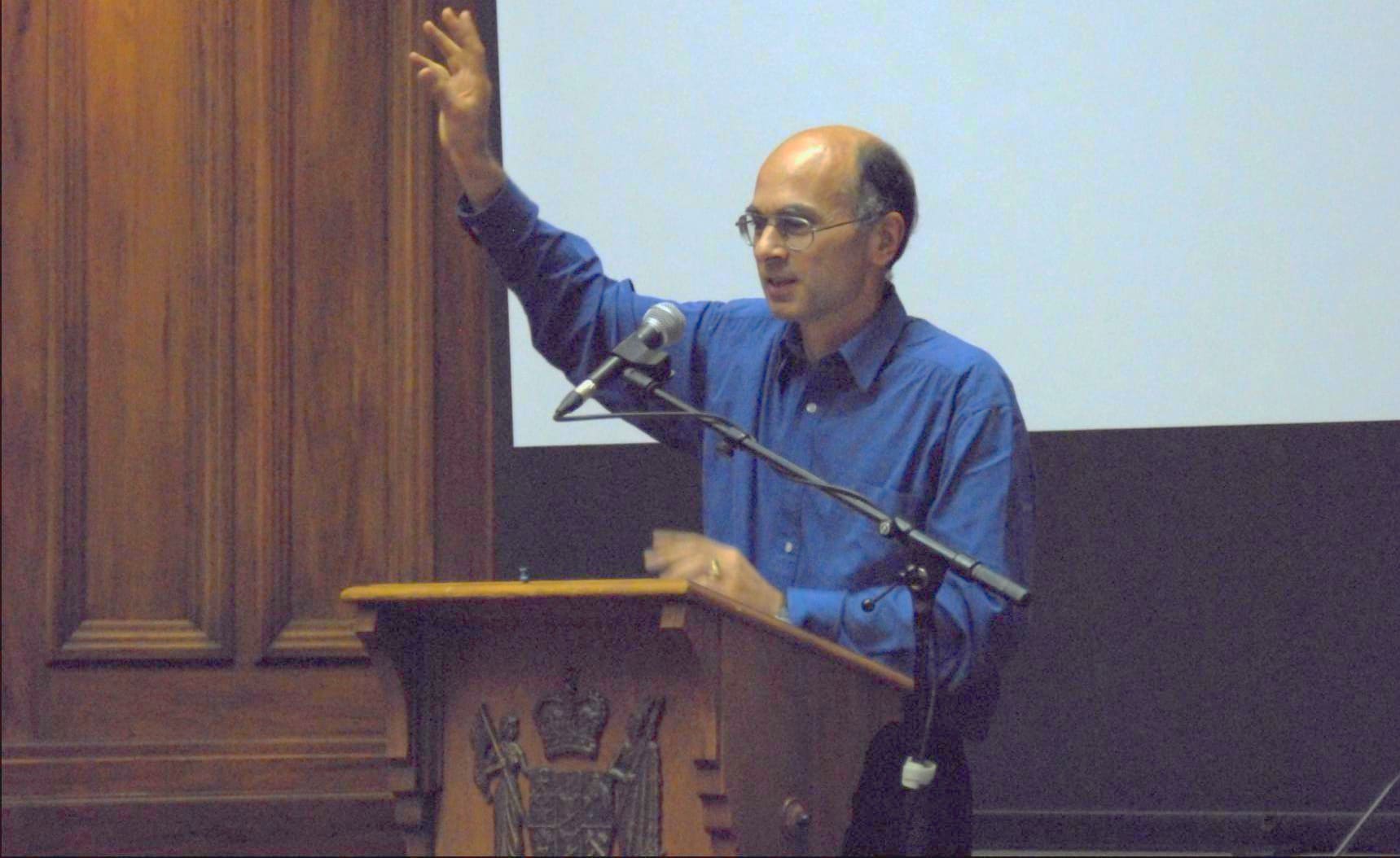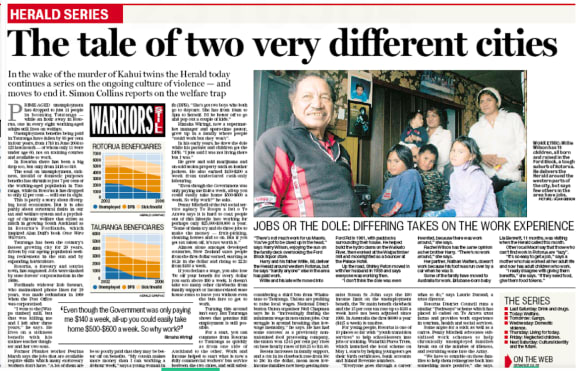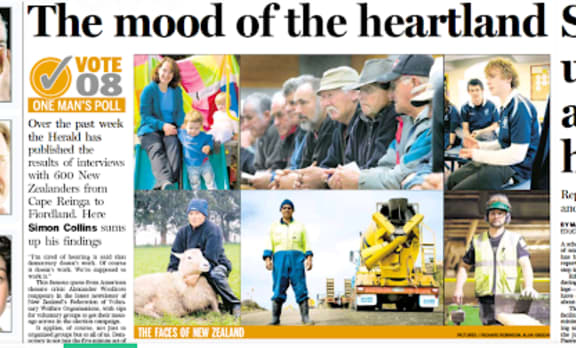Long-serving reporter Simon Collins spoke to literally hundreds of people to cover major public issues. He also confronted his own bosses to defend journalism from cuts and compromises undermining the quality of journalism. As 45 years on the job come to an end, many reporters reckon we’ll never see another journalist like him (though he's not one of them).

Simon Collins speaking about the commercial pressures on news at Parliament in 2007 Photo: Scoop.co.nz
When the news seeped out on social media last month that one of the country’s longest-serving and most respected reporters was leaving The New Zealand Herald - and journalism - it triggered a stream of tributes.
‘We won't see his like again’ was a common theme among those reacting to the retirement of Collins, who finished up at The Herald last week, bringing down the curtain on a reporting career that began at Wellington’s Evening Post in 1976.
Many said he was an inspiration they hoped to emulate - some said he'd set the bar so high that this was not a realistic aspiration.
For example, Collins interviewed 600 people from Cape Reinga to Bluff in 2008 for a week-long Herald series about the mood of the nation. He did the same before the 2005 election too.
But not only was Collins a thorough and dedicated journalist, he was also dedicated to upholding the quality of journalism - a commitment that sometimes brought him into conflict with his own employers.
That saw him hit headlines back in 2006 when he led an onstage protest at the Qantas Awards over outsourcing jobs at The Herald and TVNZ, and the cutting of other jobs.
“We can’t in all conscience celebrate excellence in journalism while our employers are undermining excellence in future by editorial cuts and contracting out,” he told the ceremony.
But attention-grabbing stunts were not Collins’ usual MO.
Simon Collins - the master craftsman of raising awareness of critical social issues, left @nzherald today after 30 years - onwards to assist St Vincent De Paul. Go well my friend, it's been an absolute treat. You don't escape without a caricature... pic.twitter.com/9yfdC9yMP2
— Rod Emmerson (@rodemmerson) March 24, 2021
He diligently documented changes in journalism behind the scenes because he feared its quality was being compromised by decisions made in boardrooms - and also by wider commercial forces at work on the media.
In 2009, he analysed the output of The Herald over 10 years to gauge the changes and gaps in coverage.
In a thoughtful speech at the Journalism Matters summit on the state of the media in 2007, he set out how newspapers, radio and television are all losing advertising and audience to the internet.
They reacted by cutting back in newsrooms - and actively encouraging “trivialisation” of the news, he said, and offshore owners were largely unconcerned by the effect to coverage of public issues.
“What we are gradually losing is public issue journalism by journalists who are paid to go out beyond their living rooms to gather new facts and present them in a coherent form to a general audience,” he said in 2007.
Since then, the web’s erosion of media companies’ revenues and its influence on journalism have both accelerated.
“The fact that everything is read online has had a huge impact on the way we write, select and cover news," Collins told Mediawatch.
"For a start, it’s made it instant. At a newspaper you could spend a day checking the facts and representing all sides of the story. These days we're trying to beat Stuff or RNZ and get things out online.
“You can check it and put up a more balanced version later - but the readers have moved on to something else by then.
“News editors can now measure exactly how many people are reading every story online. If the story gets a lot of hits the editors are looking for a follow-up straight away. But a story that’s about something important but that might be not widely read will die,” he said.
But back in 2007, Collins also warned people not to be nostalgic about the media before the internet changed the game.
He harked back to The Evening Post in 1976:
“We were very much the journal of record of the ruling elite. We had a few more investigative features, but they were very few, and the voices of people from the grassroots tended to be limited to the presidents of local residents' associations and the winners of lotteries, fishing contests or flower shows. By today's standards, you would call it dull.
“All news media today give far less deference and indeed attention to authority figures like prime ministers and mayors.
"Good journalism now is defined as putting a human face on the story, by interviewing ordinary people affected by law changes or rates increases. Human tragedies like Folole Muliaga and Nia Glassie have been taken up as effective media campaigns. Our stories have succeeded in completely changing the way power companies deal with poor customers, and I think we are also helping to change public attitudes and behaviours around child abuse and domestic violence. We have more investigative journalism (though still not enough).
"We have more news about women, Māori and other groups outside the traditional white male elite (though still not enough).
"In all these ways we have become less deferential and more critical, and that is absolutely a good thing.” - Simon Collins, 2007.
The proliferation of comment and opinion - by both professional journalists and others - is a common complaint about the media. But something Simon Collins welcomed.
“Sharing opinion is a great thing, but it needs to be shared on the basis of agreed facts in the first place. If you don’t do that carefully society is the poorer,” Collins told Mediawatch.
“Social media gets blamed for a lot, but it also democratises the sources of news."

An example of Simon Collins social issues reporting from 2008. Photo: photo / RNZ Mediawatch
“We should be building a caring community together – that should be the role of a media organisation at the moment. I think that needs to include everyone. We should not be excluding racists or any of the people whose views we disapprove of from taking part in the debate we offer a platform for.
“We should listen to them all and care for them all, rather than shutting them out and saying they’re beyond the pale and we don’t want to hear from them.”
Alongside being a journalist prepared to confront employers on matters of principle and practice, in the 1990s Collins co-founded and co-edited a free weekly paper where the journalists ran the show - City Voice.
“The idea was to empower and give a voice to ordinary people in the city. I’d been working in the Press Gallery reporting what politicians and elite people were saying. It was written partly by volunteers, we were encouraging the community to contribute,” he said.
The blurb for the 2007 Journalism Matters summit says Simon Collins was even reporting before he turned pro in 1976 - publishing a newspaper at the age of 9.

Part of a Herald series from 2008 for which 600 people nationwide were interviewed. Photo: photo / RNZ Mediawatch
“It started off as one copy of a paper I made for my parents. It was a paper about the place where I grew up - Pātea in South Taranaki. It grew during my school time, and by the end of it the circulation was about 50 and it was distributed on the school bus,” he said.
Half a century later, journalism is all over for Collins now, but he completely refutes those who say: ‘We’ll never see his like again'.
“There are wonderful people in journalism. It’s burned some people out, and it burned me out in the end, but many people will find a way into it and contribute to keeping us an informed and caring society,“ he said.
In semi-retirement, he will be a budgeting advisor for St Vincent de Paul Society.
“I’ve done one thing for a long time. It’s high time I did something else," he said.


